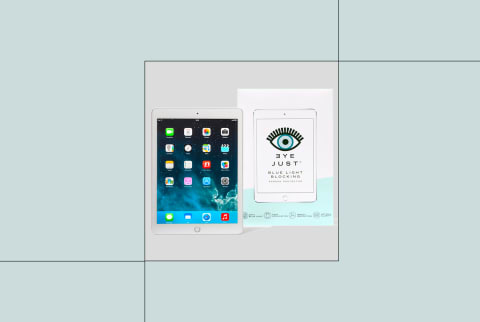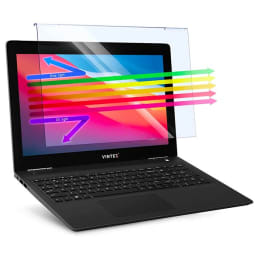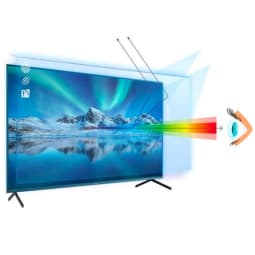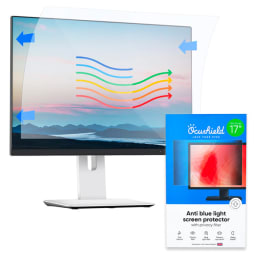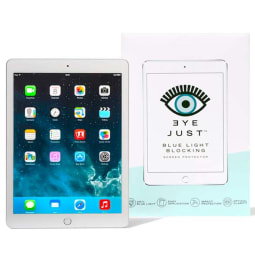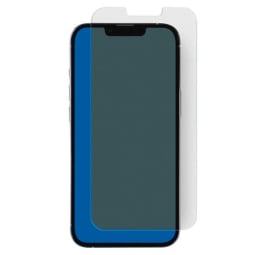So why does blue light get such a bad rap? Too much artificial blue light can disrupt your internal clock1. Overexposure from excessive screen time can also cause eye strain, headaches, and blurry vision. There are ways to limit your exposure, such as less scrolling before bed, or turning off your TV a bit earlier. But for a lot of us, our workday is tied to a computer. We’ve done the research to round up the best blue light screen protectors for every type of screen—so you can keep your body functioning at its prime, no matter how many hours you’re logging on the computer. Find our picks below, and learn how to choose the best blue light screen protector for you. It’s important to note that while there’s a lot of anecdotal evidence supporting the idea that blue-light-filtering glasses and screen protectors can help reduce eyestrain, more scientific research needs to be done to back it up. A 2017 review of three studies suggests that there’s not currently enough evidence to determine the impact these products have on our eye health and sleep-wake cycles. “Some studies suggest that devices like monitors and cellphones have a blue light wavelength that affects vision in two ways: The first is that it’s harmful to your eyes and can cause possible long-term damage,” Todd Handel, an optician at East Coast Optometry, previously told mindbodygreen. “The second, more important effect is that blue light can affect circadian rhythms and negatively impact your sleep patterns.” According to board-certified ophthalmologist Yuna Rappaport, M.D., MPH, the issue is more about our screens in general. “Screens in general cause eye strain,” she explains. “We typically have a blink rate of 18 times a minute, and when we are on screens it is down to around six—this causes dry eye and irritation.” While more research still needs to be done to prove their effectiveness, there is no reason to believe blue light screen protectors could be harmful. Particularly for the sake of your sleep, positive reviews suggest that these products may be worth trying—that is, of course, if you’re willing to spend a few bucks on the experiment. In addition, Rappaport suggests implementing the 20/20/20 rule. “Every 20 minutes look 20 feet away for 20 seconds. Keeping lubricating drops next to your computer to use is also a great idea,” she says. Many customers say this panel is easy to attach to the TV, noting that it doubles as a screen protector, too. Just be sure to read the sizing instructions because some folks say the panel they received was oversize. Before you purchase, double-check that your TV doesn’t already have a blue-light-reduction option in its display settings. If it does, that might be just as effective. Most reviewers love this protector, with a lot of positive feedback on the brand’s website claiming a decrease in migraine symptoms and eye strain, along with an appreciation of the privacy filter and anti-glare design. On the con side, several people say they had a hard time with application and were left with bubbles on their screen. Shoppers have a lot of good things to say about the customer experience team and the effectiveness of this brand’s products. People say they “noticed such a difference after just one day” of using this screen protector. It’s worth noting that some wish the size was a little smaller, mentioning that removing their iPad case sometimes causes the edges to pull up. Customers love the lack of excess packaging, easy application, and the screen’s impressive resistance to cracks. Body Guardz is also highly rated for its customer service. With the lifetime warranty and 30-day return policy, you’ll be in good hands if you need any help with your protector down the line. There are plenty of options for non-iPhone users, too. Protect your device: We selected screen protectors that not only filter blue light but are also highly rated for their ability to protect your actual screen from cracks and scratches. This often means they cost a little more money upfront, but if you’re going to put a blue light filter on your screen anyway, you might as well reap the benefit of protecting it. Consider the long term: To echo the above point about paying a little more upfront, it’s worthwhile to consider brands that offer generous replacement policies. Especially for phones, which we inevitably drop from time to time, you’ll likely end up saving cash in the long run by buying a more expensive product that has a lifetime replacement guarantee. Know the limits: Most of the claims around the benefits of blue light screen protectors are anecdotal. While that doesn’t mean it’s not worth trying one out for yourself, it’s helpful to remember that a blue light filter isn’t the only way to improve your relationship with technology. Limiting screen time in general (especially around bedtime) and adjusting your display settings to ease eye strain are great places to start.



